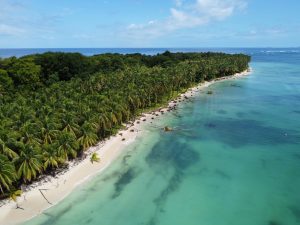In February of 2022, President Laurentino Cortizo of Panama signed into law a framework that recognizes the inherent rights of nature 1. After a year of debate at the Panama National Assembly 2, Panama now acknowledges nature’s rights to “exist, persist, and regenerate her lifecycles” 1, in a landmark decision, joining over 20+ countries with similar laws.
The Story of Nature’s Rights in Panama
Two years ago, a marine conservation biologist and National Geographic Explorer, Callie Veelenturf, realized the harmful effects of plastic pollution and fishing bycatch on the environment 1. Veelenturf saw that as long as nature had no rights, little to nothing could be done to address these harmful practices. In a monumental decision, Veelenturf urged the Panamaniam government to protect the biodiversity and ecosystems of Panama 1.

Veelenturf’s pitch caught the attention of the young Congressman Juan Diego Vasquez Guttierez, who was eager to protect one of the 25 most “megadiverse” countries on Earth 1. Guttierez believed that the “rights of nature approach ‘would represent an important paradigm shift in [his] country to centralize our cultural respect and love for nature’” 1.
When signed into law in February, nature gained the inherent rights for existing that previously only humans and corportations had.
What Does This Mean for Nature?
For nature, ‘rights of nature’ recognizes nature as a subject of law with rights that are to be protected, and respected by all persons, governments, and corporations. With the ‘rights to nature’ approach, it is easier for ecosystems, or ecosystem features such as forests and rivers, to be represented in legal cases 2. With this new framework, any person can represent nature and nature’s interests in court, and hold any harmful industry, authority, or government accountable for harm or damages 1.

However, signing nature rights into law is only the beginning of a long process. The Panamanian government must now create the standards and criteria that will be necessary when determining causes of action in protecting nature’s rights. This will include answering questions such as what is meant by significant harm to nature, or what qualifies as a healthy ecosystem 1.
Sources
1.Duong, T. “In Panama, Nature Now Has Rights Just Like People and Corporations”. EcoWatch. 23 March 2022. https://www.ecowatch.com/panama-nature-rights.html.
2.Winters, J. “Nature now has legal rights in Panama”. Grist. 1 March 2022. https://grist.org/beacon/nature-now-has-legal-rights-in-panama/.








